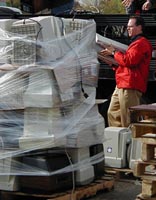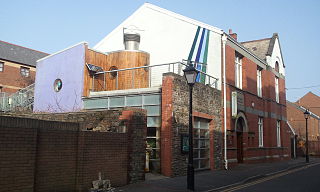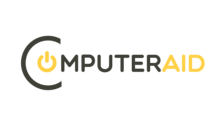
Islamic Relief Worldwide describes itself as "a faith-inspired humanitarian and development agency which is working to support and empower the world's most vulnerable people".

Electronic waste recycling, electronics recycling, or e-waste recycling is the disassembly and separation of components and raw materials of waste electronics; when referring to specific types of e-waste, the terms like computer recycling or mobile phone recycling may be used. Like other waste streams, reuse, donation, and repair are common sustainable ways to dispose of IT waste.
A social enterprise is an organization that applies commercial strategies to maximize improvements in financial, social and environmental well-being. This may include maximizing social impact alongside profits for co-owners.

Free Geek is a technology related non-profit organization based in Portland, Oregon, launched on April 22, 2000. It started as a public event at Pioneer Courthouse Square. In September 2000, it opened a permanent facility as a drop off site for electronic waste. In January 2001, local newspaper The Oregonian ran an article advertising their free computer program for volunteers, which became so successful that they had to start a waiting list. They currently have over 2,000 active volunteers per year.

Computers for African Schools is a charity based in the United Kingdom which aims to give children in developing African countries the opportunity to gain experience with and understanding of computers and IT. As of the end of 2011 CFAS had sent 30,000 computer systems to five main CFAS programme countries: Zambia (11,500), Zimbabwe (7,500), Malawi (5,500), Tanzania (900), and Zanzibar (800); and smaller quantities have also been donated to partner NGO's in Kenya, Mozambique, South Africa, Gambia, Egypt, Ghana, Sierra Leone, Niger, Ethiopia and Liberia. More than 1500 schools have computer labs set up through the scheme. Every state and mission secondary school in Zambia has been provided with at least 10 computers through the scheme.
Camara is a social enterprise that sends refurbished computers and provides digital literacy training to schools and other educational institutions in Ethiopia, Kenya, Zambia, Lesotho, Tanzania and Ireland.
Waste Watch was a non-profit, sustainability organisation based in the UK, inspiring people to live more and waste less. It was a registered charity.

InterConnection.org (IC) is an American 501(c)(3), non-profit organization headquartered in Seattle, Washington. InterConnection was established in 1999 by Charles Brennick. The organization's original focus was on developing and donating websites to non-profits in developing countries. The program soon expanded to include computer donations and technology training. In 2004 the InterConnection Computer Reuse and Learning Center opened in Seattle as a hub to serve both local and international communities.
E-Cycle Limited is a non-for-profit organisation based in Tonypandy that specialises in the data safe, ethical refurbishment, recycling and disposal of end-of-life IT and telecommunications equipment.
Digital Pipeline is a United Kingdom registered charity founded in 2005 operating under the working title Computers 4 Africa to provide access to information and communications technology (ICT) in developing countries in Africa and other parts of the world.
Vision Action is a registered charity in the United Kingdom, which provides optical aid and services to developing countries in Africa.

WorkVentures is an Australian independent not-for-profit social enterprise, established in 1979 and, as of 2010, employing more than 170 people across seven locations in Sydney and Melbourne. WorkVentures also works with partner organisations to deliver training and programs around the country.
Computer technology for developing areas is a field focused on using technology to improve the quality of life and support economic development in regions with limited access to resources and infrastructure. This area of research seeks to address the digital divide, which refers to the gap between those who have access to technology and those who do not, and the resulting inequalities in education, healthcare, and economic opportunities.
Fantsuam Foundation is a Nigerian non-profit organisation working in the field of Information and Communication Technologies (ICT) that is working to develop a rugged computer suited for African conditions. Known as the Solo computer, this wooden-encased PC is being designed to cope with the "heat and dust" of Africa.

The Environment Centre in Swansea, Wales, is an independent charity organisation for environmental information, education and activity. Environment Centre may also refer to the building the charity is located in.

The Raspberry Pi Foundation is a registered charity in England and Wales, as well as an England and Wales company limited by guarantee. It was founded in 2009 to promote the study of computer science. It is part of a group that comprises legal entities in India, Ireland, and the United States, which carry out educational activities in those jurisdictions; and Raspberry Pi Ltd, a commercial subsidiary that develops Raspberry Pi computers and other hardware. The foundation’s charitable activities are funded through a combination of Gift Aid from the profits of Raspberry Pi Ltd, contracts for the delivery of educational services e.g. professional development for teachers, and donations from individuals, foundations, and other organisations.
World Computer Exchange (WCE) is a United States and Canada based charity organization whose mission is "to reduce the digital divide for youth in developing countries, to use our global network of partnerships to enhance communities in these countries, and to promote the reuse of electronic equipment and its ultimate disposal in an environmentally responsible manner." According to UNESCO, it is North America's largest non-profit supplier of tested used computers to schools and community organizations in developing countries.

Labdoo is a non-profit organization that provides, free of charge, refurbished laptops loaded with child-friendly educational software in local languages to schools, orphanages, and refugee projects in low-income countries around the world. The organization is dedicated to not incurring additional economic cost nor contributing to the generation of CO2 emissions. Through its global network of grassroots volunteers connected through more than 400 operational hubs, it has provided its services to more than 700,000 students.










